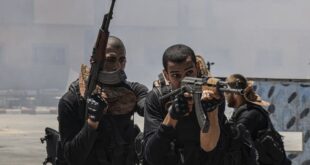GAZA CITY (AP) — Gunbattles erupted Monday night between Fateh and Hamas members in the southern Gaza town of Rafah, killing two people and wounding 14 others a day after a deadly explosion of internal violence paralysed the Gaza Strip.
The fighting was the latest in a series of sporadic battles throughout the day as tensions remained high between the two groups.
Fateh fighters enforced a general strike in many West Bank towns in a show of strength against Hamas, while the Hamas-led government ordered all ministries closed to protest Fateh attacks on government buildings.
But the level of violence remained below the chaos and running street battles that killed eight people and wounded 100 others across Gaza on Sunday.
In an effort to reduce friction, Hamas pulled its fighters out of Gaza’s major streets Monday and sent them back to their normal posts.
“Gaza today is better, and moving towards calm,” Prime Minister Ismail Haniyeh of Hamas told his Cabinet on Monday afternoon, but said he feared violence in the West Bank, where Fateh fighters threatened to retaliate for the Gaza fighting.
“We reiterate to our people to be responsible, not to spread the circle of disagreements and conflict, and not to transfer events to other parts of the nation,” Haniyeh said.
Hours after he spoke, Fateh men marched through Rafah after evening prayers to protest the Hamas-led government and its force, witnesses said. When they approached a force post, a gunbattle broke out, and five people were wounded, one seriously, they said.
The fighting ended after local Hamas and Fateh officials called on their supporters to back down.
But minutes later, a new battle erupted in a Fateh stronghold across town that killed one bystander and another unidentified person and left nine other people with bullet and shrapnel wounds. Fateh officials said Hamas fighters opened fire on Fateh supporters as they drove near a roadblock. Hamas said its force came under fire from the car and fought back.
An earlier gunbattle erupted at Gaza City’s main hospital Monday morning when relatives of one of Sunday’s victims arrived to retrieve his body.
Fateh members accompanying them opened fire on Hamas fighters patrolling the hospital. Patients and doctors ran for cover, but no one was hurt, hospital officials said.
In the northern West Bank city of Nablus, Fateh fighters shot at Deputy Prime Minister Nasser Shaer’s bodyguards as they rode in a government car, injuring two of them, said Shaer, who was not present during the attack. Hospital officials said a Fateh man was also injured.
In Jericho, a Fateh man trying to enforce the general strike shot a shopowner in the head, seriously wounding him, Fateh officials said. The wounded man was also a Fateh member, the officials said.
The latest round of violence began in Gaza on Sunday when the 3,500-man Hamas force confronted members of the Fateh-dominated security forces who were protesting the government’s inability to pay their wages. Fateh fighters responded by torching the Cabinet building in Ramallah and trashing Hamas offices in the West Bank.
Hamas, which ousted Fateh in January parliamentary elections, formed the force in April after losing a power struggle for control of the security forces with President Mahmoud Abbas, a Fateh leader elected separately last year.
While Hamas pulled its force from the main streets, Abbas ordered the striking security officers to return to work. Their protest tent — a tangible source of tension with the Hamas government — lay empty outside the parliament building in Gaza on Monday. However, a similar tent outside the West Bank parliament building in Ramallah was filled with protesters.
“The strike is still ongoing, and it seems that there is no end in sight,” said Bassem Hadaidah, a spokesman for the strikers.
The violence further dampened hopes for a coalition government between Fateh and Hamas, which was aimed at ending economic sanctions imposed on the Palestinian Authority after Hamas’ election victory. Those sanctions left the government unable to pay its 165,000 workers.
Coalition talks stalled as Abbas unsuccessfully pushed for Hamas to accept Western demands to moderate its violent ideology.
Fateh lawmaker Saeb Erekat, an Abbas confidant, dismissed the possibility of a quick return to talks.
“Coalition talks suffered before this [violence],” he said. “At the moment, we are focusing on ensuring these things will not recur.” Abbas was abroad Monday and scheduled to return Tuesday.
Violence between Fateh and Hamas loyalists plagued Gaza in the spring, but largely ended when Israel launched an offensive June 28 after Hamas-linked fighters captured an Israeli soldier.
Abu Mujahed, a spokesman for the Popular Resistance Committees, one of the groups responsible for Cpl. Gilad Shalit’s capture, said Monday that contacts with Egyptian mediators trying to broker his release had resumed, but there was no progress on a deal.
The fighters are demanding Israel release hundreds of Palestinian prisoners in return for Shalit.
Also Monday, a Palestinian fisherman was shot and killed by an Israeli gunboat off the coast of Khan Younis, Palestinian officials said. The army said it was unaware of the incident. Israel has forced fishermen to remain close to shore since the offensive began.
 Eurasia Press & News
Eurasia Press & News
